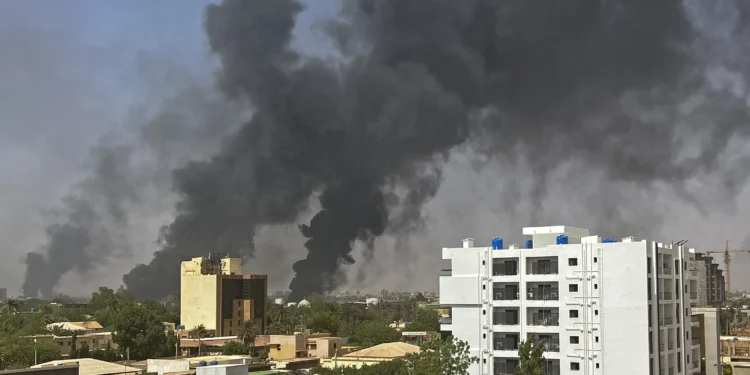Introduction
The conflict in Sudan, which began on April 15, 2023, has had devastating consequences for the country and its neighbours. Fighting between the Sudanese Armed Forces (SAF) and the Rapid Support Forces (RSF) has displaced millions, disrupted trade, and created extensive economic instability.
The roots of Sudan’s current conflict lie in tensions between military factions that had previously cooperated. After the 2021 coup that ousted Sudan’s transitional government, the SAF, led by General Abdel Fattah al-Burhan, and the RSF, led by Mohamed Hamdan Dagalo (“Hemedti”), struggled for control over military integration and economic resources.
These tensions have historical roots in Sudan’s intricate political environment. The failure to integrate the RSF into the national army, alongside disputes over the country’s lucrative economic sectors like gold mining and oil revenue, further escalated the conflict into a full-blown war in April 2023.
The fighting over two years has had a devastating effect on the civilian population, though most of the news from Sudan has been overshadowed by the Ukraine and Gaza wars.
By June 2024, it was estimated that about 150,000 people had been killed in the conflict which also displaced another 12 million, the world’s largest displacement, with most of the population facing serious food shortages. In August last year, after capturing Al-Jazirah, the country’s food centre, the RSF was accused of deliberately destroying food reserves and creating a man-made famine, even as the SAF faced charges of blocking food aid to RSF-controlled Darfur (Frontline, 2025).
Economic Consequences for Sudan
Sudan’s economy was already fragile before the conflict, but the outbreak of war has exacerbated existing challenges. Key industries, including agriculture, trade, and oil production, have suffered. Infrastructure damage and insecurity have disrupted supply chains, leading to food shortages and inflation (World Bank, 2023). As of late 2023, inflation in Sudan has exceeded 350%, with basic goods becoming unaffordable for large portions of the population (International Monetary Fund, 2023). The nation’s GDP is projected to contract by at least 8% due to the collapse of key industries and capital flight. Additionally, Sudan’s banking sector has struggled due to capital flight and international sanctions, further weakening the economy.
Security Consequences for Sudan
- Humanitarian Crisis and Civilian Casualties: Thousands of civilians have been killed in the fighting, while targeted attacks on ethnic groups, particularly in Darfur, have raised concerns about potential crimes against humanity (Human Rights Watch, 2023). Over 7 million people have been internally displaced, creating severe humanitarian challenges
- Rise of Armed Militias: As the conflict drags on, various militias and local armed groups have emerged, taking advantage of the power vacuum to establish control over different territories. The proliferation of these groups has fueled instability and made any peace negotiations more complicated.
- Border Security and Regional Spillover: The conflict has led to increased arms smuggling and cross-border security threats, particularly in Chad and South Sudan. Reports indicate that armed groups are exploiting porous borders to move weapons and recruit fighters, further destabilising the region.
- Terrorism and Extremist Activities: There is growing concern that the instability in Sudan could create a breeding ground for extremist groups seeking to exploit the chaos. Some analysts warn that ungoverned spaces within the country may serve as safe havens for terrorist organisations.
Impact on Neighbouring Countries
The economic instability in Sudan has affected several neighbouring states, particularly South Sudan, Chad, and Ethiopia.
South Sudan
South Sudan has been significantly impacted due to its economic dependence on Sudan’s oil infrastructure. The country transports its oil through Sudan’s pipelines to the Red Sea for export, a vital source of revenue for the South Sudanese government (Al Jazeera, 2023). The ongoing conflict has disrupted these exports, reducing government income by nearly 50% in 2023, exacerbating an already precarious economic situation (African Development Bank, 2023). The resulting fiscal shortfalls have affected public sector salaries, leading to increased instability in South Sudan.
Chad
Chad has experienced a surge in refugees fleeing the violence in Sudan. Over 600,000 Sudanese refugees have crossed into Chad, placing pressure on public services and resources (UNHCR, 2023). This sudden influx has increased food insecurity and strained Chad’s healthcare and educational systems. According to a report by World Food Programme in 2023, the Chadian government has had to allocate an additional $300 million to refugee aid programs, diverting resources from infrastructure and development projects.
Ethiopia
Ethiopia has also received thousands of refugees while dealing with its own internal conflicts. The influx has strained resources and raised security concerns along the Sudanese-Ethiopian border. Trade between the two nations has slowed due to instability, affecting economic activities in border regions. Furthermore, Ethiopia, which relies on Sudanese imports for certain agricultural products, has experienced a 20% price increase in key commodities like grain and cooking oil.
Broader Regional Implications
The prolonged conflict in Sudan threatens to destabilise the entire East African region. Investors have become wary of engaging with Sudan and its neighbors, reducing foreign direct investment and limiting economic growth. The withdrawal of international firms from Sudan has caused regional trade disruptions, particularly affecting cross-border commerce with Egypt and Libya. Additionally, the war has increased food insecurity, as Sudan is a major agricultural producer in the region. Disruptions in supply chains have led to price hikes in essential commodities, affecting both local populations and regional trade (African Development Bank, 2023). International organizations like the African Union and United Nations have attempted mediation efforts, but a resolution remains elusive due to the entrenched positions of the warring factions.
Conclusion
Sudan’s conflict has far-reaching consequences beyond its borders. The economic and security disruptions affecting South Sudan, Chad, and Ethiopia highlight the interconnected nature of regional economies. Addressing this crisis requires diplomatic intervention, humanitarian assistance, and economic stabilisation efforts to prevent further destabilisation in the region. Ongoing negotiations and international support will be critical in mitigating the long-term effects of the war. More coordinated responses from regional organisations, alongside stronger commitments from global powers, could help prevent further economic collapse and humanitarian disaster.
References
African Development Bank. (2023). Regional economic outlook: East Africa. https://www.afdb.org/en/documents/regional-economic-outlook
Al Jazeera. (2023). South Sudan’s oil exports disrupted by Sudan’s conflict. https://www.aljazeera.com/news/2023/5/26/south-sudan-oil-disruption
Human Rights Watch. (2023). Sudan: Escalating violence threatens civilians. https://www.hrw.org/news/2023/04/18/sudan-escalating-violence-threatens-civilians
International Crisis Group. (2023). Sudan’s conflict: Origins and escalation. https://www.crisisgroup.org/africa/horn-africa/sudan
International Monetary Fund. (2023). Economic collapse in Sudan amid ongoing conflict. https://www.imf.org/en/Publications/Sudan-Report
UNHCR. (2023). Sudan refugee crisis: Chad and regional response. https://www.unhcr.org/sudan-crisis-response
World Bank. (2023). Economic impact of the Sudan conflict. https://www.worldbank.org/en/news/2023/06/10/economic-impact-of-sudan-conflict
World Food Programme. (2023). Sudan crisis and food insecurity in East Africa. https://www.wfp.org/news/sudan-crisis-food-insecurity






























